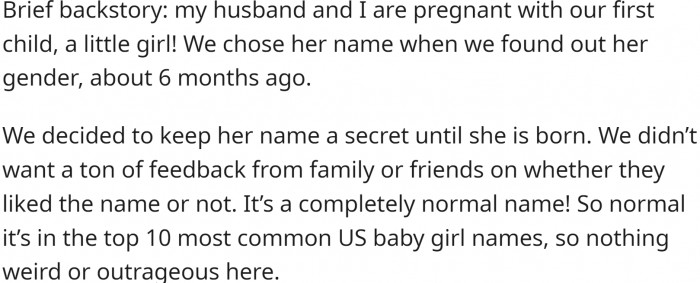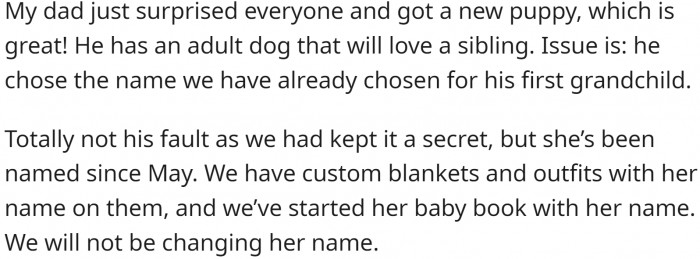Pregnant Woman Chooses Name For Her Daughter And Keeps Quiet About It, Only To Find Out Her Dad Chose The Same Name For New Puppy
Choosing a name for your family pet is usually fun and easy, right? Unlike naming a child, it allows for more creativity and is less serious.
However, pet names can still be amusing. After all, tiny Moonpie isn't being made fun of by the other animals for having a weird name.
Some people decide to give their pets names that are also human names, which can cause confusion, especially when they are calling them in the dog park.
Some people go one step further and give their pets the names of family members. Just imagine that family reunion...
Well, to be honest, sometimes it happens by accident. Pet owners may not know that they will have a family member with that name... just like in our story today.
A Reddit user asks: "WIBTA if we asked my dad to change his new puppy’s name?"
She is pregnant and has chosen a name for her baby girl a long time ago. It is a pretty common name, nothing fancy.
She never told her family about her choice, and that proved to be a big mistake.
"My dad just surprised everyone and got a new puppy, which is great! He has an adult dog that will love a sibling. The issue is: he chose the name we have already chosen for his first grandchild."
Now she wonders if it would be rude to ask him to change the puppy's name. Read the full story below:
OP asks:

OP is expecting her first child, a little girl. She and her husband have already chosen a name.

Her father just got a new puppy, and OP is really happy about it. But then she heard its name.

The Psychology of Naming and Identity
Dr. Laura Simmons, a developmental psychologist at Emory University, explains that names carry significant emotional weight and can shape our identity from a young age.
Research shows that the names we receive can influence our self-perception and how others perceive us, impacting our social interactions.
This highlights the importance of thoughtful naming, particularly in families.
Family Dynamics and Name Choices
Dr. Nicole Parker, a family psychologist at the University of Virginia, explains how family dynamics can influence name choices for children.
Her research suggests that names often carry significant emotional weight, representing family heritage, expectations, and personal identity.
When family members disagree on a name, it can reflect deeper relational tensions or unresolved conflicts.
It is not a big problem, but OP wonders if it would be rude to ask her father to change the puppy's name

OP says that "Realistically, it’s not a huge deal that my daughter and my dad’s dog will share a name, but WIBTA if my husband and I asked him to change it?"
This thread received plenty of replies, and we are showing some of the most interesting ones:
Redditors agree:

It is not a big problem

Sibling dynamics can also be influenced by naming choices, as highlighted by studies in the Journal of Family Psychology.
When parents choose similar names for siblings, it can foster a sense of unity, but it may also lead to competition or comparison.
Understanding these dynamics can help families navigate potential emotional conflicts.
In situations where a family member chooses the same name for a pet and a child, feelings of rivalry or competition can arise.
Studies in relational psychology indicate that these feelings can provoke anxiety and resentment, especially in families where identity and legacy are heavily emphasized.
Understanding these dynamics can help navigate conversations around name choices more effectively.
OP only needs a good approach

Directly asking could be awkward

OP could show her dad the things they bought

The Importance of Open Communication in Families
Effective communication is vital in addressing naming conflicts within families.
Research suggests that family discussions about names can foster understanding and reduce resentment.
Using open dialogue allows family members to express their feelings and negotiate naming choices respectfully.
Communicating About Sensitive Topics
To address sensitive issues like name choices, it’s crucial to foster open dialogue within the family.
Research indicates that using 'I' statements can help express feelings without escalating tensions, making it easier to discuss disagreements.
For instance, saying 'I feel disappointed because I was hoping to use that name' can open up a conversation without blame.
Just show the blanket...

A sense of humor is needed:

Redditors shared their experiences:

Establishing boundaries around naming choices can also be helpful.
Behavioral psychologists recommend that parents clearly articulate their naming decisions and the reasons behind them to avoid misunderstandings.
This clarity can help prevent feelings of unfairness or competition among family members.
Creating a family agreement on name selection can also mitigate conflicts.
Encouraging all family members to contribute ideas can foster a sense of inclusion and respect, reducing feelings of competition.
Additionally, recognizing that names are deeply personal can help all parties approach the discussion with empathy.
Indiana Jones reference here:

This is cute:

According to Dr. Dan Gilbert, a renowned happiness researcher, "Names can carry significant emotional weight, and the choices we make can reflect our values and connections." Recent studies indicate that "Luna" is the most popular dog name across an impressive 35 states, with Bella, Max, Cooper, and Daisy following closely behind. As Dr. Gilbert notes, "The intersection of personal and familial choices can lead to unexpected situations." While many dogs may not share these popular names, the dilemma faced by OP regarding her daughter's name is a relatable one that many families navigate.
Psychological Analysis
This situation underscores how deeply personal and emotionally charged name choices can be within families. Open communication and mutual respect are key to navigating these sensitive discussions.
Analysis generated by AI
Analysis & Alternative Approaches
Understanding the emotional significance of names within families can help navigate conflicts more gracefully.
As Dr. John Gottman emphasizes, effective communication and empathy are essential for maintaining healthy family relationships.
Navigating Emotional Responses to Naming Conflicts
Emotional responses to naming conflicts can be intense, often stemming from deeper issues of identity and belonging.
Dr. Mark Anderson, a clinical psychologist, emphasizes that recognizing these emotional triggers is key to addressing conflicts constructively.
By validating each other's feelings, families can create a supportive environment for discussion.
Practicing empathy can also help family members navigate naming conflicts more effectively.
Research indicates that when we try to understand others' perspectives, we can reduce feelings of frustration and enhance connection.
This empathetic approach fosters a supportive atmosphere where everyone feels valued.
The Role of Compromise in Family Dynamics
Compromise is essential in resolving naming conflicts within families.
Research in the Journal of Family Issues shows that families who practice compromise report higher satisfaction in their relationships.
By finding a middle ground in naming choices, families can strengthen their bonds and reduce tension.
Ultimately, navigating naming conflicts requires patience and understanding from all family members.
By employing effective communication strategies and practicing empathy, families can enhance their connections and foster a supportive environment.
In doing so, they create stronger familial bonds that can withstand future conflicts.
Analysis & Alternative Approaches
In conclusion, naming conflicts within families can lead to emotional turmoil but also present opportunities for growth.
Research emphasizes the importance of communication, empathy, and compromise in navigating these challenges.
By adopting these strategies, families can foster healthier relationships built on mutual understanding and respect.



